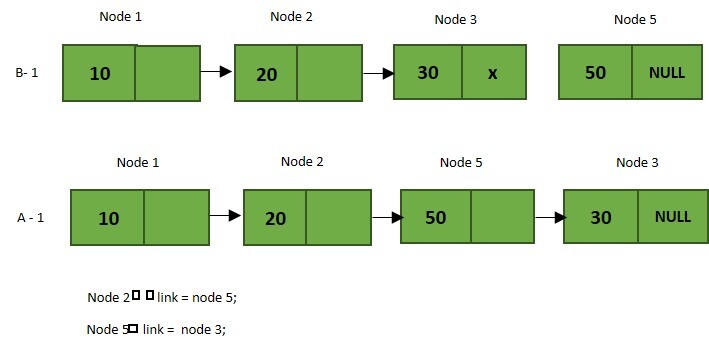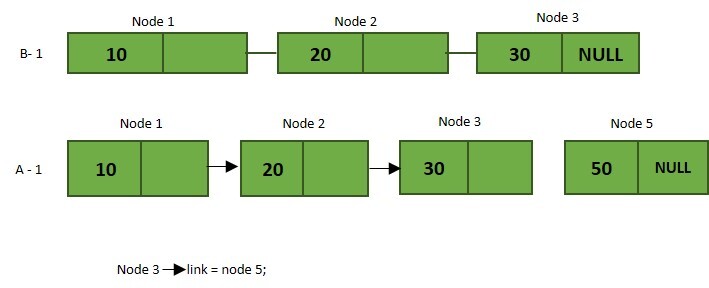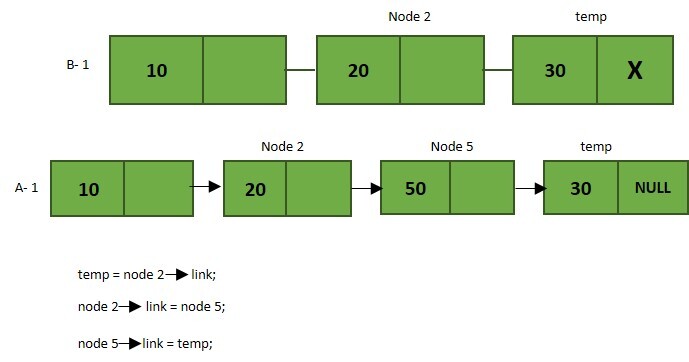
 Data Structure
Data Structure Networking
Networking RDBMS
RDBMS Operating System
Operating System Java
Java MS Excel
MS Excel iOS
iOS HTML
HTML CSS
CSS Android
Android Python
Python C Programming
C Programming C++
C++ C#
C# MongoDB
MongoDB MySQL
MySQL Javascript
Javascript PHP
PHP
- Selected Reading
- UPSC IAS Exams Notes
- Developer's Best Practices
- Questions and Answers
- Effective Resume Writing
- HR Interview Questions
- Computer Glossary
- Who is Who
Explain insertion of elements in linked list using C language
Linked List Representation
Linked lists use dynamic memory allocation, allowing them to grow and shrink as needed. They are defined as a collection of nodes, each containing two parts: data and a link. A linked list is a linear data structure where each element is known as a node, is connected to the next one using pointers. Unlike arrays, elements of a linked list are stored in random memory locations. The representation of data, links, and linked lists is shown below ?
Representation of node -

Representation of Linked List -

Insertion
Insertion operations in a linked list include inserting an element at the beginning, at the end, or after a specific node. Inserting at the beginning places the element at the start of the list while inserting at the end adds it to the list's conclusion. Inserting after a specific node places the new element immediately following the specified node.
Consider an example, where we insert node 5 between node 2 and node 3.
-
Allocate memory for a new node.
-
Store data in the new node.
-
Set the new node's next pointer to the current start node.
-
Update the start pointer to the recently created node.

Now, insert node 5 at the beginning.

Insert node 5 at the end.

Insert node 5 at the end.

Note:
- We cannot insert node 5 before node 2 as the nodes are not named.
- We can insert node 5 before 2, if its position is given.
Inserting an Element
Here is a C program for inserting an element in a linked list. It demonstrates operations such as inserting nodes at the front, end, before, and after specified nodes. The program dynamically allocates memory for new nodes and prints the list after each insertion, using scanf for input and printf for output.
#include <stdio.h>
#include <stdlib.h>
struct node {
int val;
struct node *next;
};
void print_list(struct node *head) {
printf("H->");
while (head) {
printf("%d->", head->val);
head = head->next;
}
printf("??");
}
void insert_front(struct node **head, int value) {
struct node *new_node = NULL;
new_node = (struct node *)malloc(sizeof(struct node));
if (new_node == NULL) {
printf(" Out of memory");
}
new_node->val = value;
new_node->next = *head;
*head = new_node;
}
void insert_end(struct node **head, int value) {
struct node *new_node = NULL;
struct node *last = NULL;
new_node = (struct node *)malloc(sizeof(struct node));
if (new_node == NULL) {
printf(" Out of memory");
}
new_node->val = value;
new_node->next = NULL;
if (*head == NULL) {
*head = new_node;
return;
}
last = *head;
while (last->next) last = last->next;
last->next = new_node;
}
void insert_after(struct node *head, int value, int after) {
struct node *new_node = NULL;
struct node *tmp = head;
while (tmp) {
if (tmp->val == after) { /*found the node*/
new_node = (struct node *)malloc(sizeof(struct node));
if (new_node == NULL) {
printf("Out of memory");
}
new_node->val = value;
new_node->next = tmp->next;
tmp->next = new_node;
return;
}
tmp = tmp->next;
}
}
void insert_before(struct node **head, int value, int before) {
struct node *new_node = NULL;
struct node *tmp = *head;
new_node = (struct node *)malloc(sizeof(struct node));
if (new_node == NULL) {
printf("Out of memory");
return;
}
new_node->val = value;
if ((*head)->val == before) {
new_node->next = *head;
*head = new_node;
return;
}
while (tmp && tmp->next) {
if (tmp->next->val == before) {
new_node->next = tmp->next;
tmp->next = new_node;
return;
}
tmp = tmp->next;
}
/*Before node not found*/
free(new_node);
}
int main() {
int count = 0, i, val, after, before;
struct node *head = NULL;
printf("Enter no: of elements: ");
scanf("%d", &count);
for (i = 0; i < count; i++) {
printf("Enter %dth element: ", i);
scanf("%d", &val);
insert_front(&head, val);
}
printf("starting list: ");
print_list(head);
printf("enter front element: ");
scanf("%d", &val);
insert_front(&head, val);
printf("items after insertion: ");
print_list(head);
printf("enter last element: ");
scanf("%d", &val);
insert_end(&head, val);
printf("items after insertion: ");
print_list(head);
printf("Enter an ele to insert in the list: ");
scanf("%d", &val);
printf("Insert after: ");
scanf("%d", &after);
insert_after(head, val, after);
printf("List after insertion: ");
print_list(head);
printf("Enter an ele to insert in the list: ");
scanf("%d", &val);
printf("Insert before: ");
scanf("%d", &before);
insert_before(&head, val, before);
printf("List after insertion: ");
print_list(head);
}
Output
When the above program is executed, it produces the following result ?
Enter no: of elements: 4 Enter 0th element: 1 Enter 1th element: 2 Enter 2th element: 3 Enter 3th element: 4 starting list: H->4->3->2->1->...... enter front element: 5 items after insertion: H->5->4->3->2->1->...... enter last element: 0 items after insertion: H->5->4->3->2->1->0->...... Enter an ele to insert in the list: 6 Insert after: 0 List after insertion: H->5->4->3->2->1->0->6->...... Enter an ele to insert in the list: 7 Insert before: 5 List after insertion: H->7->5->4->3->2->1->0->6->......

